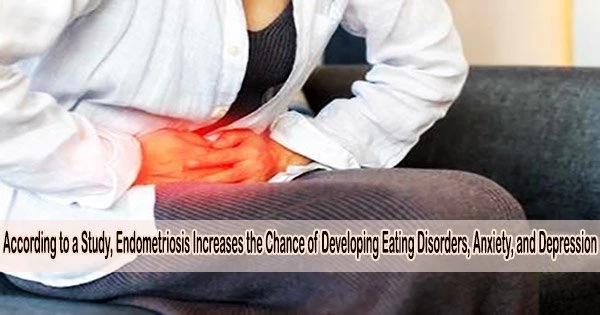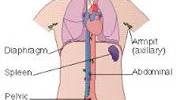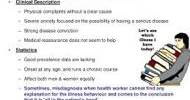Endometriosis is a systemic disease that affects the entire body, not just the pelvic region. Now, the greatest epidemiological study to date on the psychological issues that can accompany endometriosis has shown that eating disorders, depression, and anxiety are not only caused by the chronic pain endometriosis causes, but also have their own underlying hereditary pathways. The team published its findings in JAMA Network Open.
“It’s not surprising that having a genetic predisposition to endometriosis might include genetic alterations that affect other areas of the body as well,” says Hugh Taylor, MD, chair and Anita O’Keeffe Young Professor of Obstetrics, Gynecology & Reproductive Sciences at Yale School of Medicine and a co-author on the study.
“The relationship between endometriosis and mental health is more complicated than we expected,” says Renato Polimanti, Ph.D., associate professor of psychiatry and the study’s principal investigator. “The biological basis is not just chronic pain, and there is much more that we need to understand.”
Endometriosis is a painful disorder in which tissue that resembles the lining of the uterus (endometrium) grows outside the uterus. Pelvic, abdominal, and low back pain, heavy bleeding, difficult sexual activity, painful urination and bowel motions, constipation or diarrhea, bloating, nausea, exhaustion, and infertility are just a few of the symptoms that the condition presents with.
While some women may experience flare-ups around their periods, others may deal with symptoms on a daily basis. One in ten women of reproductive age suffer with the illness worldwide, yet it can be challenging to get treatment due to widespread beliefs, even among medical professionals.
“For a long time, researchers thought it was just a gynecological disease that it didn’t affect anything but female reproduction, and so women were often only treated when they presented with infertility,” says Dora Koller, Ph.D., a postdoctoral researcher in computational genomics and first author. “But we have to acknowledge that the effects of endometriosis extend far beyond reproduction.”
It’s important for the public and health care providers to know there’s a common risk for endometriosis and mood disorders. Going back to the history of endometriosis, it has far too often been blamed on the patient you’re too thin, you’re too anxious, you complain too much. It is not that. You are at increased risk for all of these conditions simultaneously based on your genetic makeup.
Hugh Taylor
Physicians need to be educated
Epidemiological studies have long revealed a correlation between endometriosis and mental health disorders, but researchers’ past explanation of this relationship was “often irresponsible” and shifted the blame onto the patients, Taylor says. “Correlation does not prove cause and effect,” he explains. “The inappropriate, wrong, and hurtful interpretation was often, ‘these are anxious people complaining about pain that all women have.’ They were wrong.”
When Taylor treats patients, he says, he makes sure not to view endometriosis in isolation while discounting its other manifestations.
Over the past ten years, Taylor’s research has concentrated on the systemic effects of endometriosis in a variety of organ systems, including the brain. His research has demonstrated through animal models that the pathophysiology of endometriosis includes mental disturbances as a component.
“We clearly show that the disease causes changes in the brain that lead to anxiety and depression,” says Taylor.
Endometriosis extends through the body
In this new study, the Yale research team obtained data from the UK Biobank which included more than 8,200 patients with endometriosis and 194,000 healthy controls.
First, after controlling for chronic pain, socioeconomic level, age, body mass index, different drugs, and co-morbid conditions, they looked into whether eating disorders, depression, and anxiety were more common in those with endometriosis. They discovered that the likelihood of developing these three psychological illnesses is markedly increased by endometriosis.
Next, the team wanted to explore the underlying genetics of this association. They conducted a genetic connection analysis and discovered that endometriosis has a highly substantial hereditary link with each of the three illnesses. They also performed a pleiotropy study to find the genetic variants that were shared. This analysis uncovered a variant, called DGKB rs12666606, shared between endometriosis and depression.
“This is a gene that is highly expressed in many brain regions as well as female reproductive tissue, which is very interesting,” says Koller.
The researchers is hoping that by conducting this study, more people would become aware of endometriosis’ numerous and less well-known forms.
“It’s important for the public and health care providers to know there’s a common risk for endometriosis and mood disorders,” says Taylor. “Going back to the history of endometriosis, it has far too often been blamed on the patient you’re too thin, you’re too anxious, you complain too much. It is not that. You are at increased risk for all of these conditions simultaneously based on your genetic makeup.”
Koller and Polimanti are also working to understand the relationship between trauma and endometriosis. In addition, Koller has recently launched a startup with a mission to find a non-invasive diagnostic tool for the disease.
The average time it takes a woman to acquire an endometriosis diagnosis in the United States is ten years, thus finding non-invasive, less expensive and quicker treatments is essential to avoiding years of needless suffering.
















